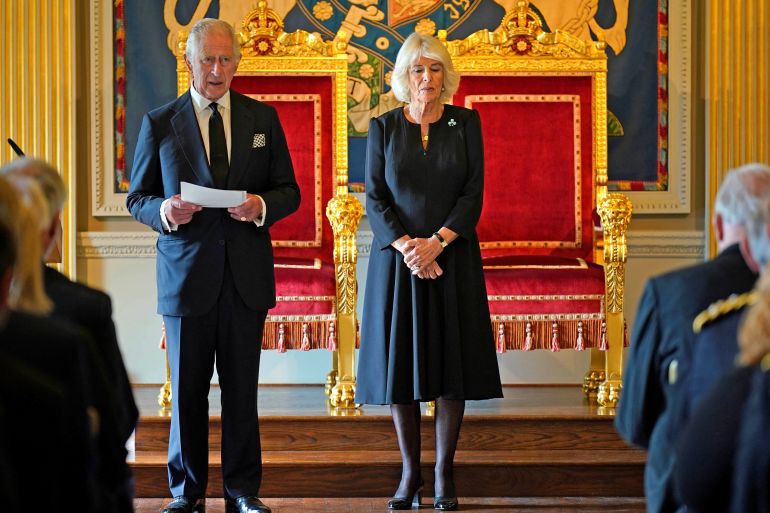Irish groups curious on Charles III’s N Ireland approach: Analyst
Unionists and Republicans remain uncertain about how the king will manage ties with rival political groups, Brian Feeney says.

King Charles III’s coming to power in the United Kingdom after the death of his mother Elizabeth II creates uncertainties for rival political groups in Northern Ireland, according to Irish political analyst Brian Feeney.
King Charles is in Northern Ireland on Tuesday, leading the mourning for Queen Elizabeth in the four parts of the United Kingdom before his mother’s coffin is flown to London ahead of four days of lying in state.
Keep reading
list of 3 itemsQueen Elizabeth remembered in Ireland for historic reconciliation
These are the countries headed by King Charles III
Feeney, who is also a historian, told Al Jazeera that the queen’s approach to Northern Ireland, over which she reigned for more than 70 years, has changed the attitude of Sinn Fein – the main Irish nationalist party – towards the British monarchy.
“Whether that will continue with the new king is another matter, but certainly the Republicans’ attitude towards the monarchy has evolved in the last decade,” Feeney said.
Sinn Fein, a republican and democratic socialist political movement, is the oldest Irish political party both in the Republic of Ireland and Northern Ireland. Sinn Fein backs the establishment of a single Irish state that unites the whole of Ireland.
Historic visit
Queen Elizabeth II was the first British monarch to visit the Republic of Ireland in a hundred years when she travelled there in 2011, under extremely strict security measures, in a powerful gesture of reconciliation.
During her visit at the time, she recognised the Irish Republic and shook hands with Martin McGuinness, a Republican politician and a former leader of the Irish Republican Army (IRA).
About 3,600 people were killed and more than 30,000 wounded from 1969 until the signing of an agreement in 1998 that largely brought peace between the IRA and other groups fighting against British rule in Northern Ireland and those battling to preserve and defend the union with Britain.
In 2011, the queen also laid a wreath in capital Dublin’s Garden of Remembrance “dedicated to all those who gave their lives for the cause of Irish freedom”.
According to Feeney, Sinn Fein was careful to separate the queen from the symbolism of the monarchy, which Republicans associate with imperialism and colonialism. Feeney says time will show how the ties with Charles will develop.
The political analyst also said that there has been nervousness among Unionists, who support Northern Ireland remaining part of the UK, with the sudden death of the queen, a constant supporter of their movement.
“They are shocked by the loss of the queen and uncertain about whether or not King Charles will have the same commitment to Unionists in the north of Ireland,” he said.